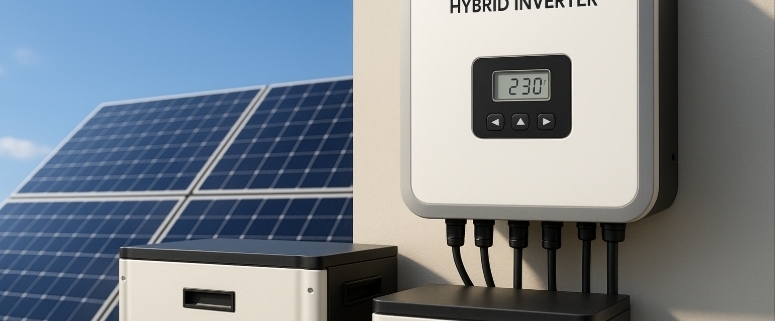Hybrid Inverter: The Future of Efficient Energy Conversion
What is a Hybrid Inverter?
A hybrid inverter is an advanced device that combines the functions of a solar inverter and a battery inverter in one. It manages power from solar panels, batteries, and the grid.
Unlike traditional inverters, which can only convert DC to AC for home use, hybrid inverters offer much more flexibility. They store excess solar energy in batteries and draw from them when needed.
This intelligent system helps reduce reliance on the grid, lowers electricity bills, and ensures power during outages.
How Does a Hybrid Inverter Work?
A hybrid inverter takes DC electricity from solar panels and converts it into AC power for home use. At the same time, it charges batteries using extra solar power or grid electricity.
When solar generation is low—say at night—the inverter automatically switches to battery power. If the battery runs low, it then draws power from the grid.
This seamless transition between sources ensures energy availability, peak-time savings, and stable voltage supply.
Key Features
Hybrid inverters offer several cutting-edge features that make them ideal for modern homes and businesses:
- Grid Interaction: Smart control over when to use or sell electricity back to the grid.
- Battery Management: Efficient charging and discharging of batteries with real-time monitoring.
- Backup Power: Keeps essential appliances running during power cuts.
- Remote Monitoring: Most hybrid inverters come with mobile apps for tracking energy usage.
- Load Shifting: Shifts electricity use to off-peak hours to reduce costs.
These features allow for dynamic energy use, especially when paired with solar and energy storage systems.
Benefits of Using a Hybrid Inverter
Choosing a hybrid inverter provides several benefits over traditional setups:
- Energy Independence: Reduces dependence on the utility grid.
- Cost Efficiency: Saves money by using stored or solar energy during peak rates.
- Reliable Backup: Ensures continuous power during outages or grid failures.
- Eco-Friendly: Maximizes solar usage and minimizes grid energy consumption.
- Space-Saving Design: Combines two inverters into one sleek unit.
All these advantages make inverters an excellent choice for homes aiming for sustainability and savings.
Applications
Hybrid inverters are commonly used in residential solar-plus-storage systems. However, they’re also gaining traction in:
- Off-grid cabins or remote areas
- Small businesses with solar rooftops
- EV charging setups
- Microgrids and community solar systems
As solar adoption grows, so will the role of hybrid inverters in managing clean, stable energy flow.
Certifications to Look for in a Hybrid Inverter
Before purchasing a hybrid inverter, always check for essential certifications. These indicate compliance with safety, quality, and efficiency standards. Key certifications include:
- IEC 62109 – Safety of power converters used in photovoltaic systems. Ensures the inverter is safe for residential and commercial use.
- UL 1741 / IEEE 1547 – Common in North America, these ensure grid compatibility and operational safety.
- CE Marking – Required in the European Union, it indicates conformity with health, safety, and environmental protection standards.
- RoHS Compliance – Confirms the product is free from hazardous substances like lead or mercury.
- ISO 9001 Certification – Demonstrates the manufacturer’s commitment to quality control and continuous improvement.
- VDE-AR-N 4105 / G99 (UK) – Required for connecting inverters to low-voltage grids in specific countries like Germany or the UK.
Always request documentation and verify certification numbers when evaluating products. A certified hybrid inverter ensures safety, better performance, and legal compliance with your local power grid.
Things to Consider Before Buying
Before investing in a Inverter, keep these points in mind:
- Battery Compatibility: Ensure it supports lithium, lead-acid, or the battery type you plan to use.
- Power Rating: Choose an inverter that matches your load and solar panel capacity.
- Efficiency Rating: Look for models with >95% conversion efficiency.
- Warranty & Support: A reliable brand should offer at least 5–10 years of warranty.
- Certifications: Before purchasing it always check for essential certifications.
Taking time to assess these factors ensures long-term satisfaction and performance.
Conclusion
A hybrid inverter is the brain of modern solar energy systems. It integrates solar, storage, and grid power into one smart solution. Whether you’re cutting costs, going green, or building energy independence, a hybrid inverter is a powerful asset.


